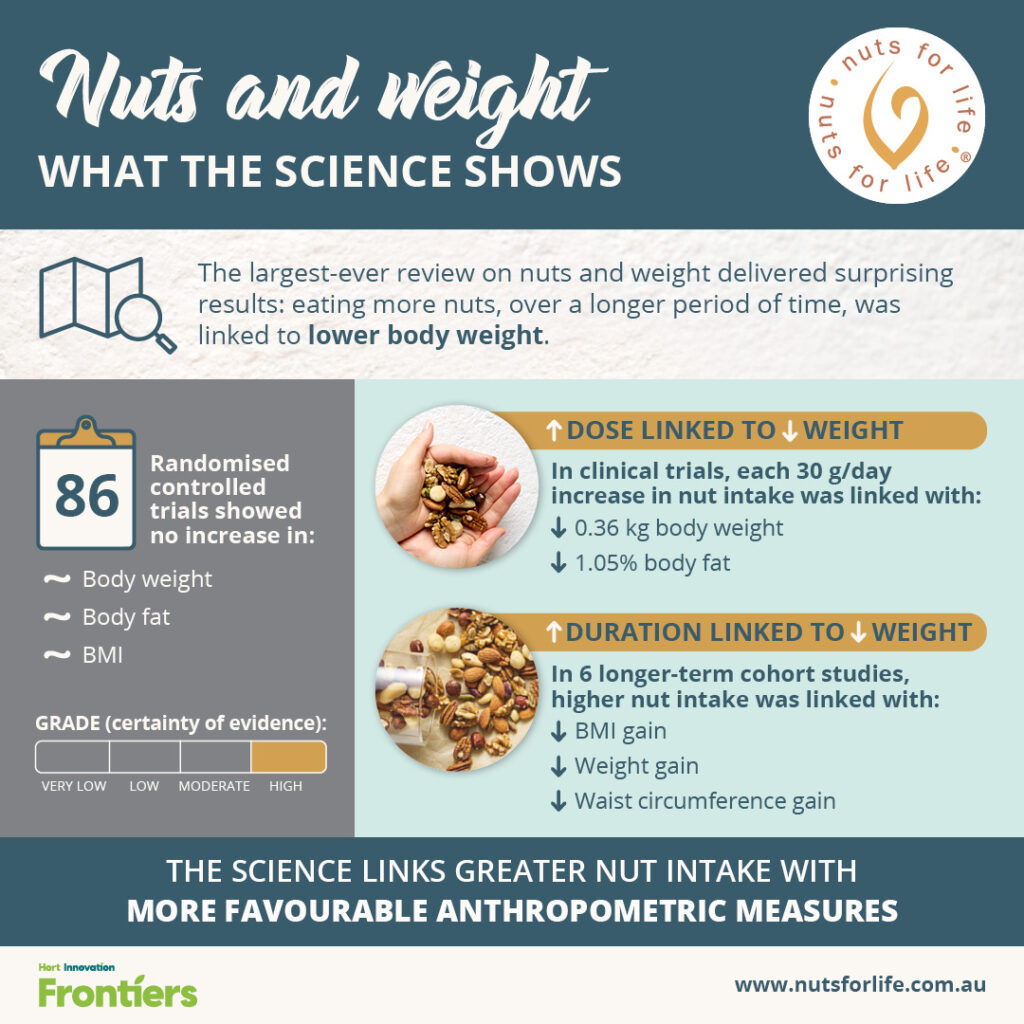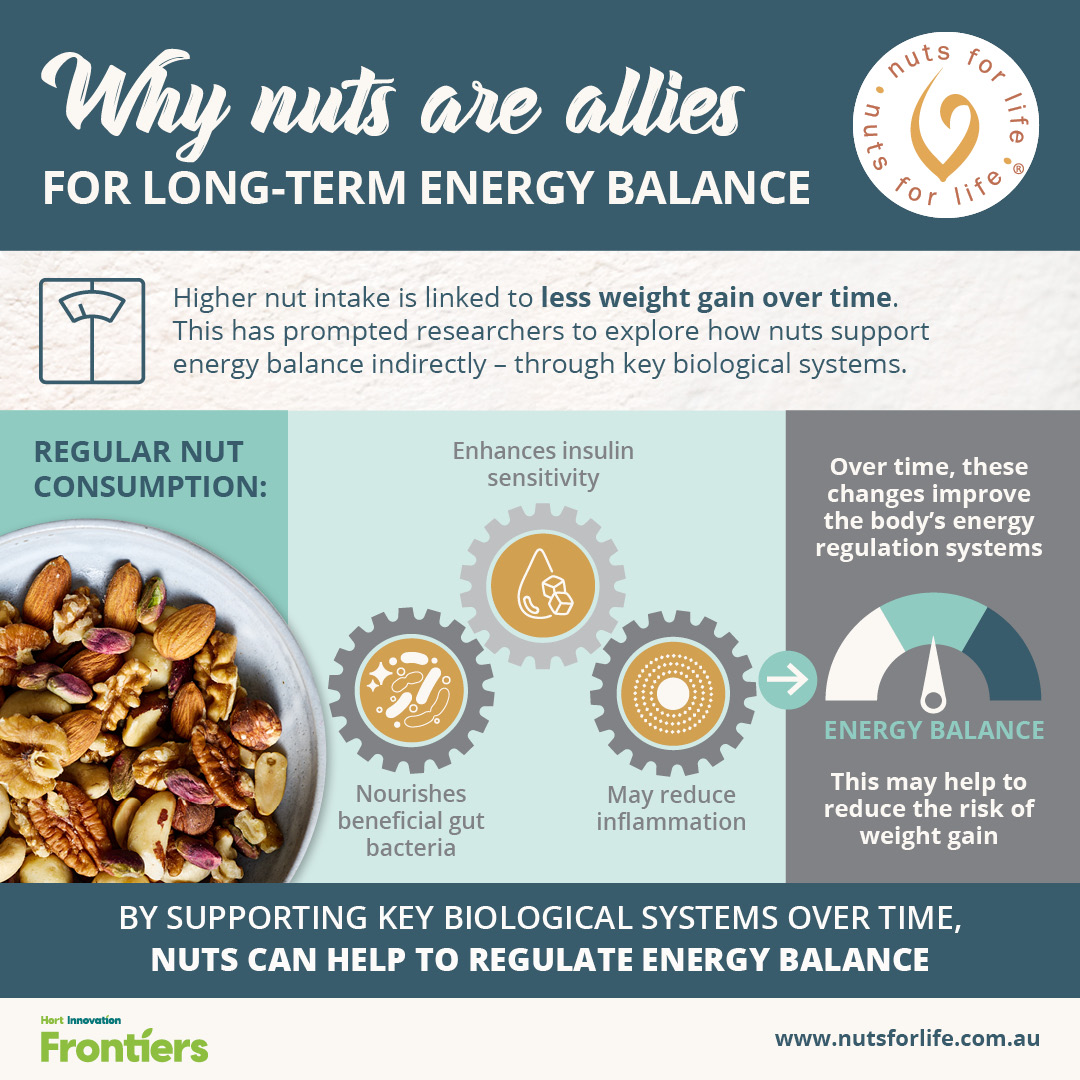Are nuts a weighty concern?

Are nuts a weighty concern?
Nuts have cemented their place as a heart-healthy food, but what about their effect on weight? The largest and most comprehensive review of the evidence on nuts and weight, published in Obesity Reviews, sets the record straight (1).
The systematic review and meta-analysis of six prospective cohort studies and 86 randomised controlled trials (RCTs), involving more than half a million people, found nut consumption does not increase body weight, and instead, supports weight management over the longer term.
Nuts were linked with a 7% lower rate of overweight/obesity in long-term prospective cohorts, and RCTs showed a ‘high certainty’ of no adverse effect of nuts on body weight.
Here’s a summary of the key findings:

The review also found that, with an overall negative energy (kilojoule) balance (such as is the case in many weight-loss diets), including nuts led to better results than omitting them – when it came to body weight, body mass index (BMI) and waist-to-hip ratio.
“Health professionals and dietary guidelines may recommend nuts, for those without allergies, for their cardiometabolic benefits without stipulations or concern of an adverse effect on weight control”. (1)
Results from the Prospective Cohort Studies:
The six prospective cohort studies involved a total of 569,910 adults, from the United States and 10 countries in Europe, that were followed by researchers for an average (median) of 18 years (range: 2.3 to 24 years).
People who ate the most nuts, compared to those who ate the least, had a:
- 7% lower incidence of overweight/obesity
- 28% lower risk of an unhealthy waist size (classed as ≥94 cm for men and ≥80 cm for women)
- 5% reduced risk of gaining ≥5kg.
Results from the Randomised Controlled Trials:
The review included 86 RCTs (the ‘gold standard’ in studies), with a combined 5,873 participants. Most of the trials were run in the US, and eight were conducted by Australian-based researchers. The average (median) follow-up duration was eight weeks (range: three to 104 weeks).
The pooled results of the RCTs showed a ‘high certainty’ in the evidence that nuts do not increase body weight, BMI or body fat, compared with control.
And ‘moderate’ certainty evidence also found no effect on waist circumference, waist-to-hip ratio, or visceral adipose tissue.
When it came to the amount (or ‘dose’) of nuts, larger amounts resulted in lower mean differences in weight and less body fat. In other words, greater reductions in body weight and body fat were seen with increasing nut doses (≥45.5 g/day). And even in studies providing 100g of nuts per day (>3 handfuls), no weight gain was reported.
Nut ‘caveats’ are outdated
Advice on nut intake, including through dietary guidelines, often comes with a ‘caution’ to limit the amount eaten.
The Australian Dietary Guidelines (ADGs) state that nuts, with a recommended serve size of 30g, are only to be used occasionally, as a substitute for other foods in the ‘protein-rich’ food group. The reason given is their energy-density.
But since the last (2013) ADGs, at least 19 major reviews have explored the link between nut consumption and body weight – and not one found that nuts lead to weight gain. And contemporary science on nuts and weight supports daily nut intakes of at least 30g.
According to the researchers of this major new review, “the concern that eating nuts contributes to increased adiposity appears unwarranted” (1).
People often eat less later in the day once they’ve eaten nuts, offsetting a proportion of the calories in nuts.
Why don’t nuts increase body weight?
There are several biological mechanisms that may help explain why nuts do not increase body weight in short-term studies, including:


The Atwater Factor, a system for determining the energy value of foods which was founded more than a century ago, may overestimate the kilojoules obtained by the body from eating nuts – by up to 26%, depending on the nut type and form.
References
- Nishi, SK., et al. Are fatty nuts a weighty concern? A systematic review and meta-analysis and dose–response meta-regression of prospective cohorts and randomized controlled trials. Obesity Reviews. 2021; e13330. https://doi.org/10.1111/obr.13330

